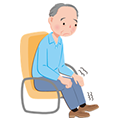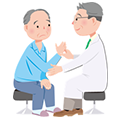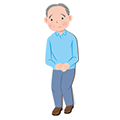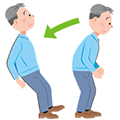What are the symptoms of Parkinson's disease?
Below are the four cardinal motor symptoms of Parkinson's disease. Each of these four symptoms may differ in severity depending on each patient.
The four cardinal symptoms of Parkinson's disease

The hands and legs quiver and shake when seated and while sleeping. When movement is initiated, the shaking often stops. This is the most typical symptom of Parkinson's disease.

The muscles become stiff and the body no longer moves smoothly. When movement becomes jerky, it is called cogwheel rigidity, and when stiffness continues, it is called lead-pipe rigidity.

Quick movements can no longer be performed. Movements become small and the arms hardly swing while walking. Movement becomes even slower when attempting multiple movements simultaneously.

A loss of balance occurs easily when pushed gently while standing. Balance and posture are difficult to regain and falls often result. These symptoms appear when the disease has progressed (Stage III on the Hoehn and Yahr severity staging scale). At this stage, medical care becomes subsidized by the Japanese government.
Other symptoms of Parkinson's disease
A variety of symptoms besides the four cardinal symptoms may appear. The symptoms shown in the table below will not necessarily be present. These symptoms also appear in other diseases, so please consult your doctor.
Abnormalities of physical function
- Gait disturbances
- Walking with a shuffling gait while slouching
- Inability to take a step when attempting to initiate gait (frozen gait)
- Speed gradually increases while walking (festinating gait) etc.
- Abnormal posture
- Stooped posture
- Leaning to one side
- Head bent down etc.
- Lack of facial expression
- Decreased blinking
- Facial expressions disappear (mask-like face) etc.
- Impaired swallowing
- Difficulty swallowing food
- Changes in handwriting
- Handwriting becomes smaller and shaky
- Handwriting gradually becomes smaller while writing
Autonomic disturbances
- Constipation
- Appears in the early stages and is seen in more than 90% of patients
- Blood pressure decreases upon standing
- Dizziness upon standing etc.
- Urinary complications
- Getting up multiples times in the night to pass urine
- Urinary incontinence etc.
Psychiatric and cognitive abnormalities
- Depression
- Insomnia
- Lack of enjoyment in whatever one does
- Dementia
- Planning things becomes troublesome etc.
Sensory abnormalities
- Hallucinations and delusions
- Seeing things that are not there (hallucinations)
- Baseless beliefs (delusions)
- Pain and numbness
- Joint pain, muscular pain
- Numbness and pain in the extremities etc.
- Reduction in the sense of smell
- Smells become indistinct
Sleep disorders
- Nocturnal awakening
- Muscular pain and stiffness upon rising in the morning






